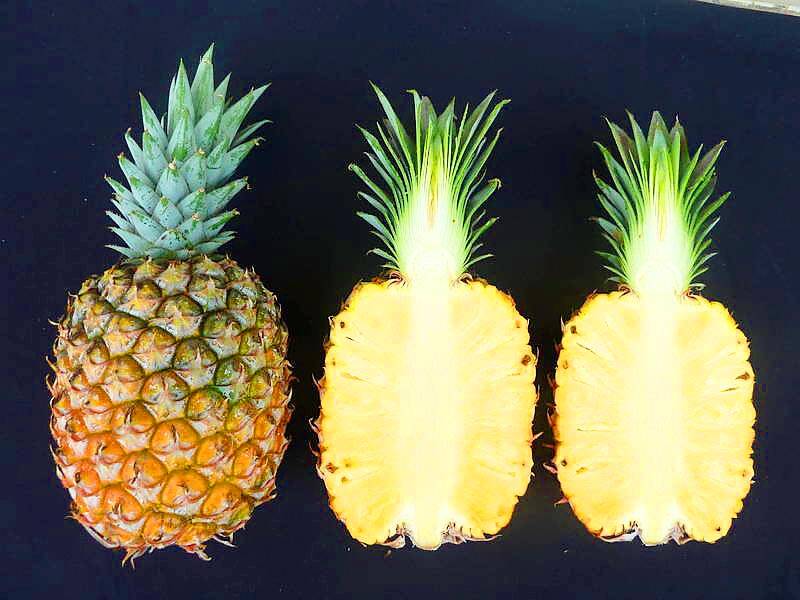Council of Agriculture Deputy Minister Chen Junne-jih (陳駿季) yesterday accused China of “robbery and a complete disregard for the rule of law,” saying that Beijing began publicly promoting a patented pineapple cultivar stolen from Taiwan.
Chinese media said the developer of the fruit was the Chiayi branch of the council’s Agricultural Research Institute in the “Chinese region of Taiwan,” Chen told the Liberty Times (the Taipei Times’ sister newspaper).
In March 2021, Beijing banned imports of golden diamond pineapples from Taiwan under false pretenses and launched a massive promotion campaign for the fruit, which it was growing illegally in Guangdong Province, he said.

Photo courtesy of the Agricultural Research Institute
The Tainung No. 23 “mango pineapple” China is producing without authorization was a centerpiece of the council’s long-term fruit export plans, Chen said, adding that the patents for the cultivar were internationally recognized.
The theft means that the untold amount of money and years of agricultural research spent on creating the pineapple might not produce returns, he said.
Taiwan and China used to have a cross-strait plant patent work group, which the two countries founded together in 2010, Chen said.
In 2016, China abruptly ceased all communications, and did not respond to calls for cooperation, despite the council’s attempts to establish contact via non-governmental channels, he said.
The council has given four companies and three farming households authorization to grow the mango-flavored pineapple, with 25 hectares under cultivation this year, he said.
Citing Chinese reports, Chen said 66.7 hectares are being used to farm the cultivar in Hainan Province.
Fang Yi-tan (方怡丹), who heads the Chiayi branch of the Agricultural Research Institute, said that access to the cultivar was supposed to be heavily restricted, and an investigation into how China gained access to it is being conducted.
Taiwan could ask Japan to ban imports of the cultivar from China due to patent protections, she said.
Japan is the largest export market for Taiwanese pineapples and patent protections ensure that the market grows, Agriculture and Food Agency Director-General Hu Jong-i (胡忠一) said, adding that the council aims to export 20,000 tonnes of the fruit.
Local farmers are expected to grow about 383,000 tonnes of pineapples this year, he added.

A preclearance service to facilitate entry for people traveling to select airports in Japan would be available from Thursday next week to Feb. 25 at Taiwan Taoyuan International Airport, Taoyuan International Airport Corp (TIAC) said on Tuesday. The service was first made available to Taiwanese travelers throughout the winter vacation of 2024 and during the Lunar New Year holiday. In addition to flights to the Japanese cities of Hakodate, Asahikawa, Akita, Sendai, Niigata, Okayama, Takamatsu, Kumamoto and Kagoshima, the service would be available to travelers to Kobe and Oita. The service can be accessed by passengers of 15 flight routes operated by

GIVE AND TAKE: Blood demand continues to rise each year, while fewer young donors are available due to the nation’s falling birthrate, a doctor said Blood donors can redeem points earned from donations to obtain limited edition Formosan black bear travel mugs, the Kaohsiung Blood Center said yesterday, as it announced a goal of stocking 20,000 units of blood prior to the Lunar New Year. The last month of the lunar year is National Blood Donation Month, when local centers seek to stockpile blood for use during the Lunar New Year holiday. The blood demand in southern Taiwan — including Tainan and Kaohsiung, as well as Chiayi, Pingtung, Penghu and Taitung counties — is about 2,000 units per day, the center said. The donation campaign aims to boost

ENHANCING EFFICIENCY: The apron can accommodate 16 airplanes overnight at Taoyuan airport while work on the third runway continues, the transport minister said A new temporary overnight parking apron at Taiwan Taoyuan International Airport is to start operating on Friday next week to boost operational efficiency while the third runway is being constructed, the Ministry of Transportation and Communications said yesterday. The apron — one of the crucial projects in the construction of the third runway — can accommodate 16 aircraft overnight at the nation’s largest international airport, Minister of Transportation and Communications Chen Shih-kai (陳世凱) told reporters while inspecting the new facility yesterday morning. Aside from providing the airport operator with greater flexibility in aircraft parking during the third runway construction,

MORE FALL: An investigation into one of Xi’s key cronies, part of a broader ‘anti-corruption’ drive, indicates that he might have a deep distrust in the military, an expert said China’s latest military purge underscores systemic risks in its shift from collective leadership to sole rule under Chinese President Xi Jinping (習近平), and could disrupt its chain of command and military capabilities, a national security official said yesterday. If decisionmaking within the Chinese Communist Party has become “irrational” under one-man rule, the Taiwan Strait and the regional situation must be approached with extreme caution, given unforeseen risks, they added. The anonymous official made the remarks as China’s Central Military Commission Vice Chairman Zhang Youxia (張又俠) and Joint Staff Department Chief of Staff Liu Zhenli (劉振立) were reportedly being investigated for suspected “serious